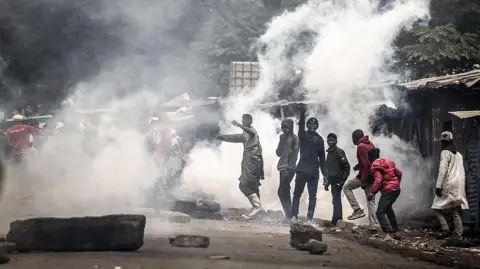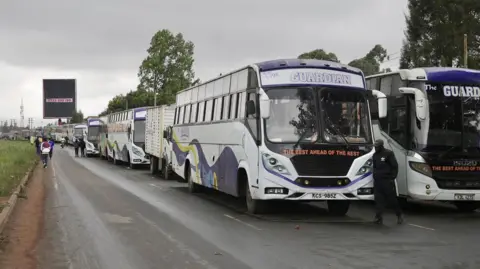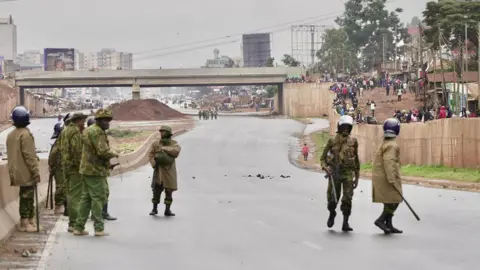BBC Information, Nairobi
 AFP through Getty Photographs
AFP through Getty PhotographsKenyan police have fired tear gasoline to disperse protesters within the newest in a wave of anti-government rallies that started final yr.
The demonstrations mark the thirty fifth anniversary of the historic Saba Saba (7 July 1990) protests that launched Kenya’s push for multiparty democracy.
From early morning, safety forces blocked all main roads into central Nairobi forward of the protests. The town centre appeared abandoned, with companies shut and a heavy police presence on the streets.
Elsewhere in Nairobi, clashes broke out as demonstrators lit fires and tried to breach police cordons. Officers responded with tear gasoline and water cannon.
The police fired tear gasoline to disperse individuals on Thika Highway, in addition to in Kitengela, a city on the outskirts of the capital. In Kamukunji, close to the venue the place the unique Saba Saba protests had been held, police battled teams of protesters who lit fires on the streets.
The remainder of the nation was largely quiet, though some clashes had been reported.
Earlier, tons of of early-morning commuters and in a single day travellers had been stranded at checkpoints, some greater than 10km (six miles) from town centre, with only some automobiles allowed by means of.
Inside the metropolis, roads resulting in key authorities websites – together with the president’s official residence, State Home, and the Kenyan parliament – had been barricaded with razor wire.
Some colleges suggested college students to remain at residence.
By mid-morning on Monday, tons of of in a single day passengers remained stranded exterior town centre, with main roads nonetheless closed.
Some long-distance buses had been parked in Kabete, about 13km from town centre, with many passengers who couldn’t afford to pay more money for motorbike rides to their locations remaining there.
Humphrey Gumbishi, a bus driver, mentioned they’d began their journey on Sunday night solely to seek out the police highway block within the morning.
“We began travelling at 8:30pm final evening… We wish the federal government to have interaction in a dialogue with Gen Zs so all this may come to an finish,” he informed the BBC
 Anthony Loneliness / BBC
Anthony Loneliness / BBC Anthony Loneliness / BBC
Anthony Loneliness / BBCIn an announcement issued on Sunday night, the police mentioned it was their constitutional responsibility to guard lives and property whereas sustaining public order.
Monday’s demonstrations had been organised primarily by the so-called Gen-Z younger individuals, demanding good governance, larger accountability, and justice for victims of police brutality, persevering with the wave of anti-government protests since final yr.
On 25 June, not less than 19 individuals had been killed and 1000’s of companies looted and destroyed in a day of nationwide protests that had been being held in honour of these killed in final yr’s anti-tax protests.
Current demonstrations have turned violent, with studies of infiltration by “goons”, who’re accused of looting and attacking protesters. Civil society teams allege collusion between these teams and the police – accusations the police have strongly denied.
On Sunday, an armed gang attacked the headquarters of a human rights NGO in Nairobi. The Kenya Human Rights Fee (KHRC) had been internet hosting a press convention organised by girls calling for an finish to state violence forward of Monday’s protests.
The KHRC spokesman, Ernest Cornel, mentioned that the gang was made up of not less than 25 individuals on motorbikes chanting: “There will probably be no protest in the present day”.
“They had been carrying stones, they had been carrying golf equipment… they stole laptops, they stole a telephone and so they additionally took some valuables from journalists who had been there,” he informed the BBC Newsday programme.
The unique Saba Saba protests had been a key second that helped usher in multiparty democracy in Kenya after years of one-party rule.
The response by the then authorities beneath President Daniel arap Moi was brutal. Many protesters had been arrested, whereas not less than 20 individuals had been reportedly killed.
Since then, Saba Saba has come to symbolise civic resistance and the combat for democratic freedom in Kenya.
Extra tales about Kenya from the BBC:
 Getty Photographs/BBC
Getty Photographs/BBC

